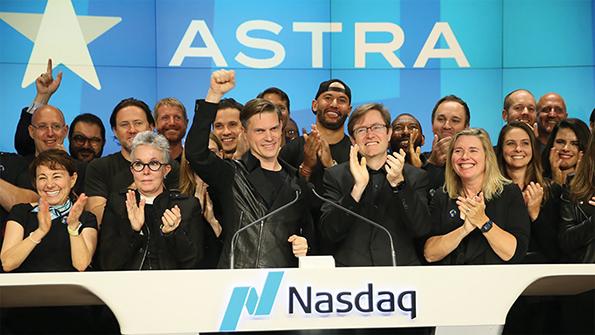
Astra Space co-founders Chris Kemp (left, center) and Adam London (right, center) enjoyed their startup’s public debut in June 2021.
While the first quarter of 2024 is not yet over, the year already is destined to be the last for many once-high-flying space startups. From Astra Space to Terran Orbital and others, many of the companies that shot to prominence in 2019-21 after reverse mergers with special-purpose acquisition companies, which allowed them to become publicly traded investments, now are going private or going away.
Astra Space will go private by accepting a recently lowered buyout bid from its co-founders and top executives, who say the rocket and engine upstart was facing imminent liquidation. CEO Chris Kemp and Chief Technology Officer Adam London, along with their investment backers, will take the Alameda, California, company private. The deal is expected to close in the second quarter, a March 7 announcement states.
- About 12 space companies turned to SPACS
- Lockheed offers to acquire Terran Orbital
In late February, Kemp and London, who own controlling stakes in Astra, cut their bid to pay just 50 cents per outstanding share, down from the $1.50 they offered in November. They cited ongoing cash burn, including paying consultants, and said it would be better to give shareholders something rather than nothing via Chapter 7 bankruptcy.
The co-founders have indicated an intent to continue the business, but no details have been announced.
The take-private deal marks a nearly complete reversal from the $2.6 billion valuation the startup sported when it became a publicly traded company after a reverse merger with a special-purpose acquisition company (SPAC) in February 2021. Astra, which once aimed to launch payloads to low Earth orbit almost every day by 2025, at one point saw itself competing with SpaceX and Rocket Lab. But rocket-launching efforts stopped in mid-2022 after numerous mission failures.
Meanwhile, Lockheed Martin is offering to buy small-satellite startup Terran Orbital for what would amount to a roughly $606 million enterprise value. Although Lockheed already owns more than a quarter of the startup, the move would secure Lockheed’s new-space supplier while putting an end to a dramatic couple of years for Terran.
In a U.S. regulatory filing on March 1, Lockheed announced it had made a nonbinding offer to buy Florida-based Terran, starting with paying $1 in cash for each share of outstanding Terran common stock. Like Astra and other space SPACs, the company traded at about $10 per share when it went public.
Other space SPACs similarly have been grounded in recent months. Space tug startup Momentus admitted in January it may have received a fatal blow after losing the U.S. Space Development Agency’s (SDA) recent competition for 18 so-called Tranche 2 satellites, recent U.S. regulatory filings state.
On Jan. 12, Momentus said in a Securities and Exchange Commission filing that it had laid off 20% of its staff toward the end of December.
Roughly a dozen space-related startups became publicly traded during the SPAC frenzy that started with Virgin Galactic’s SPAC dealmaking in October 2019. That space tourism company in late 2023 announced a strategic pause in business operations as it races to get its Delta-class suborbital vehicles into service by 2026 before running out of cash.
Other companies also have downshifted. Velo3D, a maker of additive manufacturing machinery for SpaceX and other aerospace and defense customers, ousted its founding chief executive in December and has been considering so-called strategic alternatives.
The latest space SPAC headlines follow Virgin Orbit’s demise, which started a year before. But not all space SPACs are flailing. Rocket Lab, which is competing with SpaceX in everything from rocket launches to satellites, bought some of Virgin Orbit’s assets and recently became an SDA prime contractor after winning a potential $515 million award for Tranche 2.
Rocket Lab Chief Financial Officer Adam Spice, speaking on March 19 in California at the annual Roth Capital Partners investor conference, noted how hard space launch is for any company, let alone space SPACs.
“Satellites are difficult, applications from space are difficult, but launch is by far the hardest thing to execute on,” Spice said. “It’s hard, not just the mechanics and physics of it, but just the cost of capital. There was a period of time over the last 3-5 years where there was a significant amount of capital flowing into startup companies, and I think those days are past. Now the people who have those capabilities have them.”





